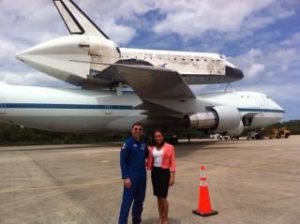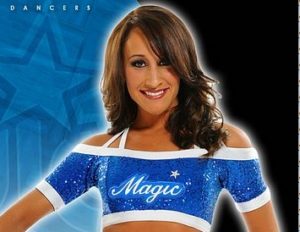 Please welcome Ashley, who is an Orlando Magic cheerleader who works with NASA Kennedy Space Center. She’s also collecting microbes at the 4/10 Magic game as part of our new research project, Project MERCCURI, to send microbes to space! This interview was conducted by Pete Maddon, a freelance journalist based in Los Angeles, California and a contributor at SciStarter, our sister site. Thanks for the assist, Pete! [Note: Ashley retired from the Orlando Magic in 2013.]
Please welcome Ashley, who is an Orlando Magic cheerleader who works with NASA Kennedy Space Center. She’s also collecting microbes at the 4/10 Magic game as part of our new research project, Project MERCCURI, to send microbes to space! This interview was conducted by Pete Maddon, a freelance journalist based in Los Angeles, California and a contributor at SciStarter, our sister site. Thanks for the assist, Pete! [Note: Ashley retired from the Orlando Magic in 2013.]
What turned you on to science and when?
I grew up on the Space Coast and was lucky enough to witness shuttle launches from my backyard, so science and space have always been close to my heart. I have always been interested in math and numbers, so I pursued my first degree in finance. From there I went on to pursue an additional business degree in management and a master’s in business administration, all from the University of Central Florida. A friend who worked out at NASA KSC told me about the co-op program they had where students work as an intern while in school. I did some research and applied to the program. I interned for six months while still in school and once I graduated I was offered a full-time position.
What was your favorite and/or most challenging courses you’ve taken so far?
The most challenging part of my degree was completing my Masters in Business Administration in one year. UCF has a full-time MBA program, and it was definitely difficult to do while dancing for the Orlando Magic, teaching dance, and working at NASA as a co-op. It took a lot of determination, dedication, and focus in order to finish my degree.
 What’s the best part of your job?
What’s the best part of your job?
The best part of my day job is being a part of history. Beginning in 1958, from beating the Soviet Union in the race to put astronauts on the moon, to the space shuttle program, to recently exploring the surface of Mars with robotic vehicles, NASA continues to make historic achievements.
As I sat answering these interview questions the walls started rumbling, so I jumped up and ran outside just in time to see the Delta 4 rocket launch which was carrying a new GPS satellite. I find that amazing! NASA employs some of the most talented scientists and engineers, and I am so honored to be a part of it. As a contract specialist my job is to work with engineers to purchase goods and services to support their activities. The products I purchase can be as small as nuts and bolts and as large as rocket engines, for a variety of different projects and contracts, and worth millions of dollars. Recently, I purchased LEDs [light-emitting diodes] for the International Space Station!
Space exploration and advanced scientific research programs promoted by NASA are extremely important to the security and welfare of the United States of America and must remain a national priority. NASA’s accomplishments have made it possible to place a man on the moon, orbit people around the planet in minutes, and built a space station. Some inventions created by NASA have been commercialized and include cochlear implants, scratch-resistant eyeglass lenses, insulin pumps, and water filters. My role at NASA plays a very small part in the big picture, but all of the civil servants working together allow for extraordinary things to happen.
What teams have you cheered for, how long you’ve cheered for them, and why did you try out to be a professional cheerleader?
I have been with the Orlando Magic for 5 years. Once I saw the girls down on the court dancing their hearts out with so much energy and passion, I knew it was something I wanted to be a part of. I love performing, and I don’t know where else I would have the opportunity to dance in front of 20,000 people every night. I grew up an Orlando Magic fan so representing the team has been such an honor and an amazing experience!
Which came first: your interest in science or your interest in cheerleading?
My interest in dancing actually came first. My mother owns a dance studio where I started dancing before I even knew what science was!
How do the qualities that make you a great cheerleader benefit you in your science career?
My experiences as a professional cheerleader have allowed me to grow as an individual in so many ways. Before becoming a cheerleader, I was very shy and introverted. The confidence and determination I have gained will benefit my career as well as all aspects of life.
There are stereotypes about cheerleaders in our society that make it seem unlikely that a cheerleader could be a scientist. Have you faced a situation where you had to challenge a stereotype about cheerleaders (or scientists)?
I feel very strongly about breaking down negative stereotypes. Many people have not taken me seriously and have written me off because of the cheerleader stereotype. It has been something difficult to overcome but I feel rewarded when I’m able to breaking the stereotype. I want to share my passion and break down not only this stereotype but the many others that plague our society. No one should be held back because of a stereotype.
What was your best cheerleading experience?
I have been blessed with so many amazing opportunities. Some of the best include the feeling of going out onto the court my very first game and every game after it, winning the Eastern Conference Finals in 2009 on our home court, going to the NBA Finals, traveling the world, hosting the 2012 NBA All Star Game, and being a part of an amazing group of young women that are now lifelong friends.
What was your best science-related experience?
My best science-related experience would be touring the space shuttle Endeavor. It was such a neat experience. I got to see everywhere the astronauts worked and lived and actually sat in the pilot’s seat! I also witnessed the shuttle taking off on top of a 747 for its last flight. I even signed the entrance way, which will be on display with the shuttle in a museum. I feel like I left a little piece behind with history.
If you could rewind the clock and change your degree, would you? If so, to what and why? If not, why not?
If I could rewind the clock and go back, I would not change my degree. I really enjoyed my undergraduate and graduate classes and feel each decision has led me to where I am today.
What advice would you give your 12-year-old self?
My advice may sound cliché but, Never give up! No matter what anyone says or thinks, go with your gut and do your thing!
What’s one thing people might find especially surprising about you?
One thing people might find surprising and interesting about me is I have torn my ACL and meniscus twice in the past five years during my cheerleading career. Both injuries were from trampoline dunking. Even after the first injury and surgery I was determined to get back to dunking. After two years back on the tramp I had a repeat injury. I had a second surgery and went through another 6 months of physical therapy before I could even start dancing again. The entire process made me a stronger person and more determined than ever!
Apart from work and cheering, what are some of your favorite activities?
I love going to the beach, fishing, four-wheeling, kayaking, and pretty much anything else outdoors! I like being adventurous and trying new things!
What are your plans for the future?
My plans for the future are to continue working at NASA and eventually go back to school and pursue a doctorate degree. I also want to stay involved in the dance and cheerleading community. I plan to continue choreographing and hopefully begin coaching!
Why do you want to be a Science Cheerleader?
I want to be a Science Cheerleader because feel I can share my passion for cheerleading AND science. I want to inspire others to follow their hearts and go after their dreams.


WOW, impressive use of led technology! This science cheerleader is amazing!
Charles
Illuminated LED Menus